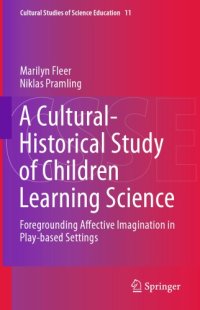
Ebook: A Cultural-Historical Study of Children Learning Science: Foregrounding Affective Imagination in Play-based Settings
Author: Fleer Marilyn, Pramling Niklas
- Tags: Early childhood education, Education, Éducation de la première enfance, Jeu--Aspect psychologique, Science--Study and teaching, Sciences--Étude et enseignement (Première enfance), Science -- Study and teaching, Sciences -- Étude et enseignement (Première enfance) -- Études transculturelles, Jeu -- Aspect psychologique -- Études transculturelles, Éducation de la première enfance -- Études transculturelles
- Series: Cultural Studies of Science Education 11
- Year: 2015
- Publisher: Springer Netherlands
- City: Dordrecht
- Language: English
- pdf
Section 1: Theoretical foundations for learning science in early childhood -- Learning science in everyday life? a cultural-historical framework -- How preschools environments afford science learning -- Imagination and its contributions to learning in science -- Theoretical and conceptual insights? the young learner in science -- Section 2: Knowledge construction in science -- Knowledge construction in early childhood science: The human invention of empirical, narrative and theoretical -- Knowledge construction is culturally situated -- Positioning children in research and the implications for our images of their competence -- Section 3: The pedagogical construction of learning science -- Learning and metaphor: Bridging the gap between the familiar and the unfamiliar -- Simile, metaphor and learning to perceive the world in functional and culturally relevant ways -- Learning to?read? and produce graphical representations -- The nature of educational encounters -- Theoretical and conceptual insights? representations in science -- Section 4: Models of early childhood teaching -- A cultural-historical model of early childhood science education.;This book provides an account of children?s science learning beyond the traditional constructivist and social-constructivist view. It conceptualises science as a body of knowledge that humans have constructed (historically) and reconstructed (contemporary) to meet human needs. As such, this human invention acts as an evolving cultural tool for supporting and helping to understand everyday life. Drawing upon cultural-historical theory, the book theorises early childhood science education in relation to current globalised education contexts. Its aim is to advance the understanding of the many ways that science concepts are learned by very young children. The book presents a theoretical discussion of the cultural-historical foundation for early childhood science education. It examines contemporary theories of learning and development within the general field of early childhood education. This theoretical examination allows for the foundational pedagogical context of young learners to be interrogated. This kind of analysis makes it possible to examine play-based contexts in relation to opportunities for scientific conceptual development of young children. From a cultural-historical point of view, and taking into account relevant empirical literature, the book introduces and promotes a more relevant approach to the teaching of science and for the development of young children?s scientific thinking. The book ends with presenting a pedagogical model for introducing scientific concepts to young children in play-based settings.
Download the book A Cultural-Historical Study of Children Learning Science: Foregrounding Affective Imagination in Play-based Settings for free or read online
Continue reading on any device:

Last viewed books
Related books
{related-news}
Comments (0)